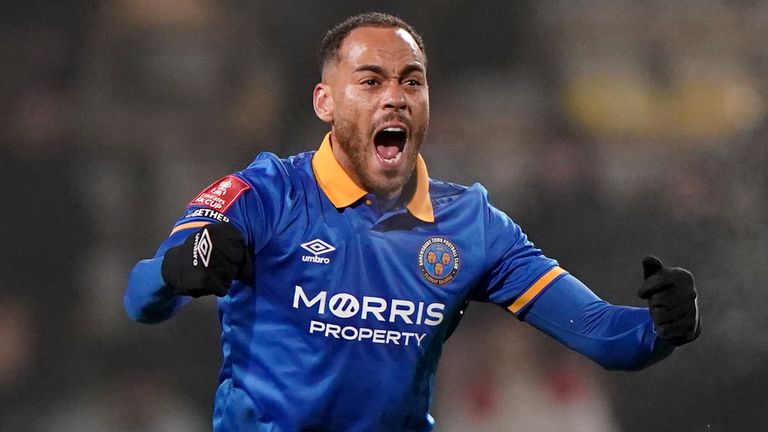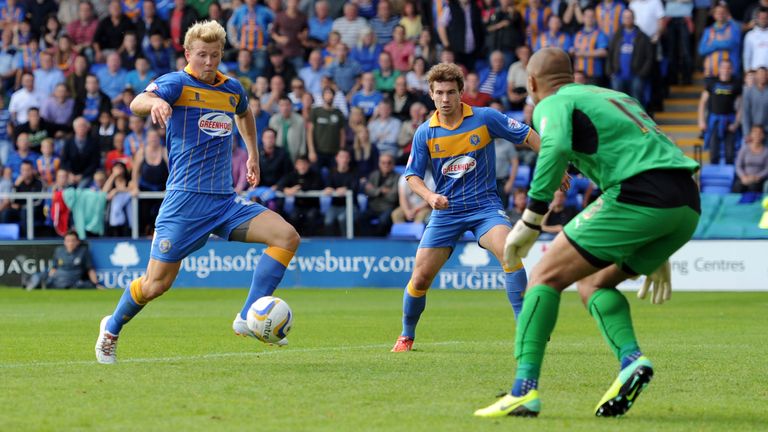Rainbow Laces: Shrewsbury’s Elliott Bennett ‘surprised’ to be only club ambassador for LGBTQ+ campaign | Football News
Elliott Bennett has made over 500 league appearances in 16 years as a professional, winning promotions with Brighton, Norwich and Blackburn.
However, when the Shrewsbury player made headlines last season, it was due to having taken on an off-field role that broke new ground in English football.
The League One club announced Bennett as the club’s Rainbow Laces ambassador – the first appointment of its kind in the men’s professional game.
He was vice-captain at the time and told the Shrews’ website he was “proud to be part of any campaign that involves equality and making sure football is for everyone”.
It was a voluntary decision which further elevated Bennett’s reputation for being an active ally and a strong voice on diversity and inclusion issues, not least for Town’s LGBTQ+ and allies supporters group, Proud Salopians, which was founded in 2019.
Rainbow Laces is currently enjoying its annual activation across British sport while also marking 10 years since its original introduction to men’s football.
Bennett continues to be the only known player to serve as its designated ambassador at their club.
When asked by Sky Sports News reporter Nick Ransom if he was surprised by that, he said: “Yeah, I am, to be honest. I think normally when someone does something, it quickly follows on.
“But I’m sure a lot of clubs are doing different things and maybe go down different avenues to make everyone feel included.
“I’m proud of what we’re doing here at Shrewsbury Town and long may that continue.”
The 34-year-old initially left The Croud Meadow when his contract expired at the end of last season but within two months, he had returned to the club on a new one-year deal.
He is now the Shrews’ third captain, in recognition of his leadership skills, and has been a regular starter at right wing-back, with Matt Taylor’s team lying in mid-table after 20 games.
The club will be activating Rainbow Laces at its next home game, against leaders Portsmouth on December 16. Club skipper Chey Dunkley will wear the rainbow armband while bespoke corner flags and a special edition matchday programme will add to the visibility.
Another Shrews player who has shown commendable allyship in recent weeks is goalkeeper Harry Burgoyne. The 26-year-old started up a crowdfunder after two inclusion-related banners were stolen from the stadium in November and quickly raised enough money to replace them both.
One was for Her Game Too, for which Burgoyne is an advocate, while the other banner was provided by Proud Salopians to promote the group within the ground.
Having that presence at each home fixture is hugely valuable to co-founder Andy Garden, who has worked closely with the club over the last four years.
“If there is anybody out there that is coming to terms with their sexuality as they’re growing up and wants to feel a part of a similar group whilst enjoying the sport that they love, we are there for people,” he explained to Sky Sports.
Part of the Shrews’ support for Rainbow Laces last year was the release of a 20-minute video showing a conversation between Bennett and Dr Leanne Rimmer, a defender and vice-captain with the women’s team.
Rimmer is a senior psychology lecturer at Manchester Metropolitan University and also works as a psychotherapeutic counsellor in the NHS.
During the chat, Bennett asks Rimmer what the campaign means to her. She shares a story about how wearing a rainbow lanyard in her day job helped give a student who was struggling with their sexuality the confidence to approach her and ask for guidance.
“He knew he could trust me and that I wouldn’t judge him,” she explains. “Whether it’s laces, a lanyard or a badge, for the people who need it the most, it is massively important and it does hold a lot of meaning and value.”
Bennett and Rimmer also discuss the impact on fans of hearing homophobic abuse in football stadiums, particularly when it’s coming from their fellow supporters; issues related to holding the men’s FIFA World Cup in Qatar, where same-sex relationships are criminalised; and the significance of having out gay or bi players in the men’s game, such as Jake Daniels and Josh Cavallo.
The landscape has certainly changed since the original Rainbow Laces activation 10 years ago, when Shrewsbury were one of the first clubs to get involved.
Several players wore the laces in the home game on that weekend in September 2013, when Wolves were the visitors. The focus back then was purely on men’s football and tackling the taboo that existed around talking about LGBTQ+ inclusion.
Since then, the rise of the women’s professional game, within which many players are publicly out, has helped to shift the dial, alongside the growing number of supporter groups for lesbian, gay, bi and trans fans and their allies.
However, recent high-profile incidents of discriminatory chanting in the Premier League have served as a reminder of the need to keep raising awareness around this part of inclusion.
Bennett brushes off any suggestions that Rainbow Laces is no longer necessary.
“It’s easy to say keep politics and football aside,” he added.
“When you’re from any other background, you have a right to a voice and if players and people around the game, can speak about these topics and make sure that people feel welcome… if that’s “bringing politics into football”, then that’s what’s got to happen.”
Sky Sports is a member of TeamPride which supports Stonewall’s Rainbow Laces campaign, currently receiving its annual activation from November 25 to December 10.
Your story of being LGBTQ+ or an ally could help to make sport everyone’s game – please contact us here to discuss further.



Pingback: Japanese models
Pingback: เว็บเกมสล็อต
Pingback: Aviator